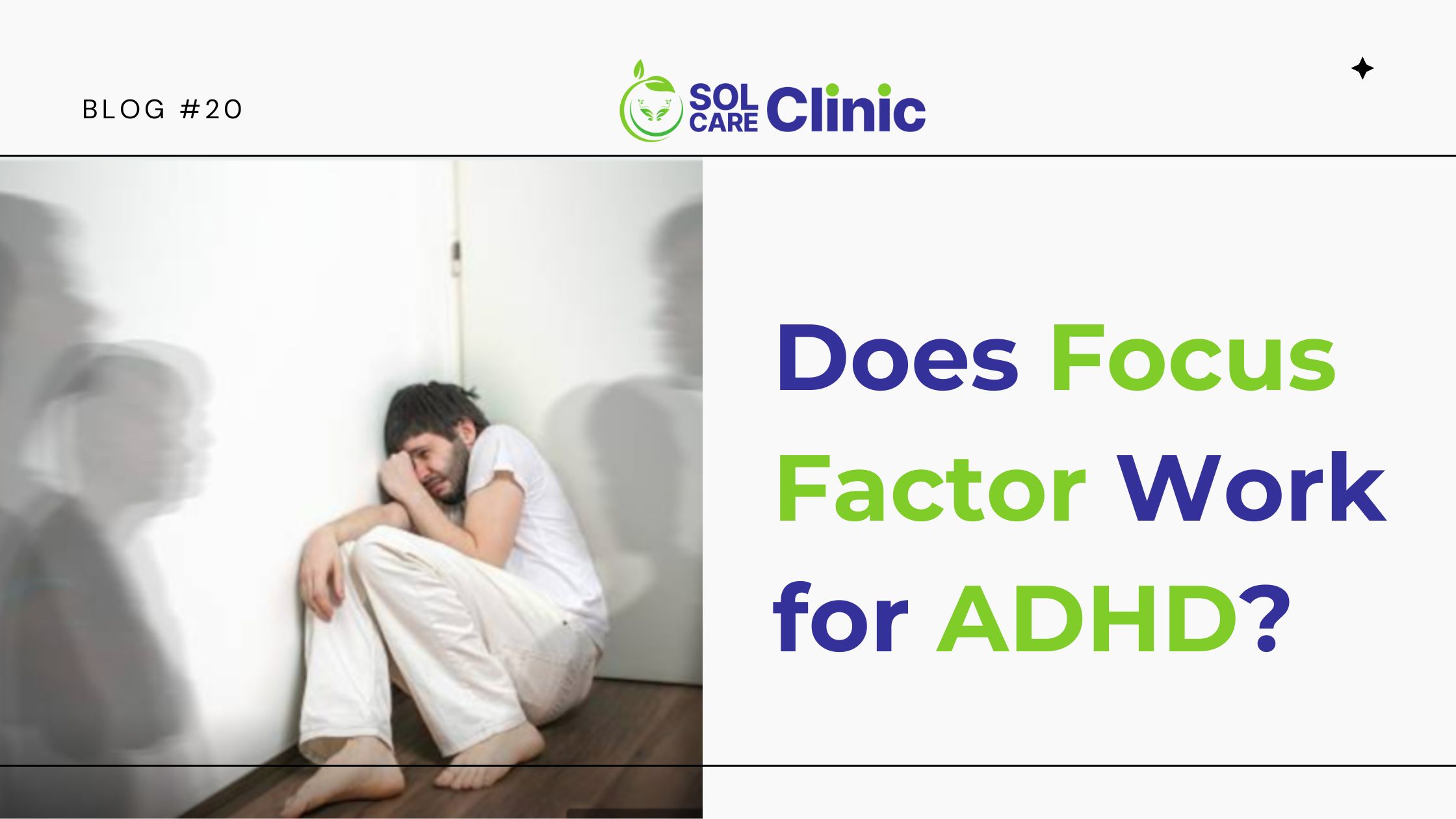ADHD is a condition that affects millions of people globally, manifesting in symptoms such as difficulty maintaining attention, impulsivity, and hyperactivity. For individuals living with ADHD, finding effective ways to manage these symptoms is crucial for daily functioning and quality of life. While prescription medications such as stimulants (e.g., Adderall and Ritalin) are commonly used, there has been a growing interest in dietary supplements like Focus Factor, a product marketed to improve brain function, memory, and concentration.
However, the question remains:
Does the Focus Factor actually work for ADHD?
Let’s explore the ingredients, scientific research, and potential effectiveness of this supplement in managing ADHD symptoms.
What Is the Focus Factor?
Focus Factor is a popular dietary supplement that claims to support cognitive function by improving memory, focus, and concentration. It contains a blend of vitamins, minerals, omega-3 fatty acids, and proprietary ingredients designed to promote brain health. Marketed to both children and adults, it is often viewed as a natural alternative to prescription ADHD medications, especially for those hesitant to take pharmaceuticals or concerned about side effects.
The Ingredients In Focus Factor
To understand how Focus Factor might work for ADHD, it’s essential to break down its key ingredients and how they impact brain function. Some of the main components include:
-
Omega-3 Fatty Acids (DHA and EPA):
Omega-3s are known for their role in brain health. DHA, in particular, is a crucial building block of brain tissue, while EPA supports healthy brain inflammation responses. Research suggests that children with ADHD may have lower levels of omega-3 fatty acids, and supplementation could potentially improve symptoms like attention and impulsivity.
-
Phosphatidylserine:
This fatty substance is found in high concentrations in the brain and is vital for cognitive processes. Some studies have shown that phosphatidylserine supplements can improve memory, attention, and mental clarity.
-
DMAE (Dimethylaminoethanol):
DMAE is a chemical compound that is believed to boost the production of acetylcholine, a neurotransmitter involved in memory and learning. Some proponents claim that DMAE can help improve focus and reduce hyperactivity, though conclusive research is lacking.
-
Vitamins B6, B12, and Folic Acid:
B vitamins play a critical role in brain health by supporting the production of neurotransmitters such as serotonin, dopamine, and norepinephrine. These neurotransmitters regulate mood, behavior, and attention, which are often affected in individuals with ADHD.
-
GABA (Gamma-Aminobutyric Acid):
GABA is a neurotransmitter that helps calm the nervous system. It can reduce anxiety and improve focus, making it a potentially useful component for managing ADHD symptoms.
-
Vinpocetine and Huperzine A:
Both of these compounds are thought to enhance cognitive function by increasing blood flow to the brain and inhibiting the breakdown of acetylcholine, respectively. These ingredients are often used in supplements aimed at boosting memory and concentration.
The Science Behind Focus Factor for ADHD
Despite the promising ingredients, the effectiveness of Focus Factor for ADHD remains an open question. Most of the existing research on ADHD treatments revolves around pharmaceutical interventions like stimulant medications. However, let’s look at the available evidence behind the key ingredients in Focus Factor and their potential to alleviate ADHD symptoms.
-
Omega-3 Fatty Acids and ADHD
Several studies have investigated the link between omega-3 supplementation and ADHD symptoms. Research published in the Journal of the American Academy of Child and Adolescent Psychiatry showed that children with ADHD who received omega-3 supplementation experienced moderate improvements in hyperactivity, impulsivity, and attention. However, while omega-3s are beneficial for overall brain health, the effects are generally more subtle than those of stimulant medications.
-
Phosphatidylserine for Cognitive Function
There is some evidence to suggest that phosphatidylserine could improve cognitive function, especially in children with ADHD. A study published in Neuropsychiatric Disease and Treatment found that children who took phosphatidylserine supplements showed improvements in ADHD symptoms, including hyperactivity and impulsivity. While this research is encouraging, it’s important to note that more large-scale studies are needed to confirm these findings.
-
DMAE and ADHD
DMAE has been touted as a potential cognitive enhancer, but the research supporting its use for ADHD is limited. Some studies suggest it may help improve attention and reduce hyperactivity in individuals with ADHD, but the evidence is largely anecdotal. More rigorous research is needed to determine whether DMAE can provide consistent benefits for ADHD symptoms.
-
GABA’s Calming Effects
GABA is known for its calming effects on the nervous system, and individuals with ADHD often struggle with anxiety or excessive nervous energy. While GABA may help promote relaxation and reduce stress, its direct effects on core ADHD symptoms like inattention and hyperactivity are not well established. That said, reducing anxiety could indirectly help improve focus in some individuals.
Does Focus Factor Really Work for ADHD?
While some of the ingredients in Focus Factor have shown promise in supporting brain health and cognitive function, there is no conclusive evidence that Focus Factor itself can effectively treat ADHD. Most of the available studies on ADHD treatment focus on prescription medications, and while certain ingredients in Focus Factor, like omega-3s and phosphatidylserine, have been linked to improvements in attention and behavior, these effects tend to be mild.
Furthermore, the proprietary blend of ingredients in Focus Factor hasn’t been extensively studied in people with ADHD. Each individual responds differently to supplements, and what may work for one person might not work for another. It’s also worth noting that the effects of supplements like Focus Factor are likely to be far more subtle than the effects of stimulant medications, which are considered the gold standard for ADHD treatment.
Limitations of Focus Factor for ADHD
While Focus Factor may provide some cognitive benefits, it’s important to manage expectations. The supplement is not a replacement for clinically proven ADHD treatments, especially in cases of moderate to severe ADHD. Here are a few limitations to keep in mind:
- Lack of Clinical Trials: There are no large-scale clinical trials specifically evaluating the effectiveness of Focus Factor in individuals with ADHD. While some ingredients have been studied independently, the supplement as a whole has not undergone the rigorous testing required to be considered an evidence-based treatment for ADHD.
- Mild Effects: Even the ingredients that have been studied, such as omega-3s and phosphatidylserine, tend to produce mild effects that may not be sufficient for managing more severe symptoms of ADHD.
- Potential Side Effects: Although Focus Factor is generally considered safe, some individuals may experience side effects like headaches, digestive issues, or allergic reactions to certain ingredients. It’s always a good idea to consult with a healthcare professional before starting any new supplement.
- Cost: Focus Factor is more expensive than many other dietary supplements, and the benefits it provides may not justify the price for everyone. Given the relatively mild effects, individuals looking for stronger symptom relief might prefer to stick with traditional ADHD treatments.
Conclusion
Focus Factor contains ingredients that are known to support brain health and may offer some benefits for individuals with ADHD. However, the current evidence suggests that these effects are mild and likely insufficient for managing moderate to severe ADHD symptoms. For individuals with mild ADHD or those looking for a natural cognitive booster, it could be worth trying, but it should not be considered a replacement for traditional ADHD medications. Always consult a healthcare provider before making significant changes to your treatment plan.





